May 2017 Culture and Society
Read the articles selected in May 2017
Putting the movement of people at the heart of British history
Source: The Economist, 16 May
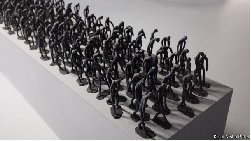
In London, the first museum in Britain dedicated to migration intends to be a place where to see this hot political issue in its historical depth, since immigration has forged the national character from very long times. The fears that surround foreigners recur in the history.
Read more:
http://www.economist.com/blogs/prospero/2017/05/e-pluribus-britannia
Fans de.. à vos claviers d’ordinateur
by Catherine Rollot
Source: Le Monde, 21 May

On Internet are circulating more than 750.000 stories that appropriate, continue, and give new life to characters of popular best-sellers and classics of not only literary fiction. These no professional authors, that interact with the community online, deconsecrate the literary creation and the relation writer-reader.
Adaptations au cinéma: “Moteur”
by Audrey Levy
Source: Le Monde, 25 May

At Cannes ‘Festival have been presented twelve films based on literary texts. It is a peculiar market which increases the national value of a work, ensuring at the same time its international acknowledgment and translation in many languages. But a beautiful story not always brings commercial success.
La Palme de la controverse pour Netflix
by Alexandre Piquard
Source: Le Monde, 21 May
In the controversy provoked by Netflix determination to offer soon online its two films produced and presented at Cannes’ Festival emerge the accomplished technological change of vision ‘s device and the question about what will this mean for the cinema meant as an art and not only as a consumeristic product.
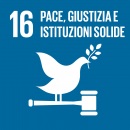
Time of Remembrance and Reconciliation for those who lost their lives during the Second World War, 8-9 May
Source: http://www.un.org
These international days have been the occasion for UN Member States to think about the importance to ensure international peace and security, always threatened by new challenges, with peaceful means and efforts, remembering that the United Nations was born of the Second World War.
Read more:
http://www.un.org/en/events/remembranceday/resources.shtml

SDG Watch Europe recommendations for Council conclusions on the EC Communication: next steps for sustainable European future
Source: http://www.asvis.it, 5 May
After a year and a half from the 2030 Agenda adoption by the UN member States, it’s time for European institutions to outline a set of concrete actions, providing for the political failures in the fields of poverty, inequalities, environment and the loss of faith in the European Union.
Read more:
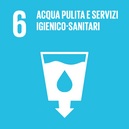
Thirsting for justice
Source: http://www.righttowater.info, 22 March
A new report about Europe’s Roma highlights how the denial of the human right to water and sanitation reveals depth discrimination for the most disadvantaged and marginalized. Living without a near water source and toilets is to be considered as an inhumane and degrading treatment.
Read more:
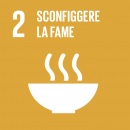
Food waste is the world’s dumbest environmental problem
by Andy Murdock
Source: https://www.vox.com, 9 May
Famine in the world, as well the climate change, can’t be faced without tackling food waste. Food waste produces 7 percent of greenhouse gas emissions. According to a UN Fao analysis, the global waste, put together, could form the second-largest country on the Planet.
Read more:
https://www.vox.com/videos/2017/5/9/15594598/food-waste-dumbest-environmental
EU- Kommission sagt Eurozone bessere Entwicklung voraus
Source: Frankfurter Allgemeine, 11 May
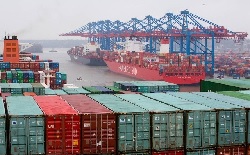
After the European Commission in the Eurozone is expected an economic growth for 2017 and 2018, with the GDP rising to 1,8%. They predict an improvement in exports and investments, in spite of the risks linked with the U.S. economic policy and Brexit.
Read more:
Les saints de glace: qui sont-ils vraiment?
by Marie-Aude Bonniel
Source: Le Figaro, 10 May

The catholic Church remembers on 12th, 13th and 14th May the Saints of ice, so called by the popular tradition to explain the sudden and late colds in this time of year. Among them, Saint Pancras was the first Christian to undergo the decollation.
Read more:
Tout sur “Guernica”
by Michel Lefebvre
Source: Le Monde, 5 May
In Madrid, an exposition dedicated to Guernica represents an important historical document on this Picasso's work and the historic avant-garde art, when the fascism and barbarism required a return to realism, which turns out in this universal work not pedagogical and dreadful in its truth.
Thinking fast, and faster
by Andy Beckett
Source: The Guardian, 11 Maggio
Our world going toward the merging of the digital and the human looks like a product of science fiction, that during the Sixties imagined a society “to a higher level” and transformed by technology.The speed of the change has become the dimension of contemporary thought.
Les Afriques à l’honneur
by Philippe Dagen
Source: Le Monde, 29 April
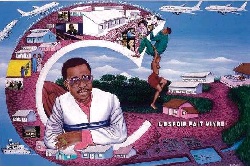
At the Fondation Louis Vuitton , two expositions confirm the recognition in the international cultural world and by public institutions of contemporary African art, for long considered as a “coloured” undercategory.
Jean Renoir, le patron du cinéma français
by Daniel Psenny
Source: Le Monde, 29 April

The channel Arte proposes a series of restored movies by Jean Renoir, and rare pieces from television archives that build a fresh portrait of this great director, son of a great painter, who considered the cinema as a game and its function, “to open windows”.
Why humans must not give up the quest for Mars
by Nicky Jenner
Source: The Guardian, 1 May
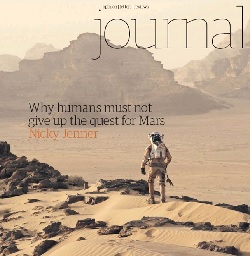
Although missions to Mars are very expensive and may be more interesting planets to explore, the red planet has so much inspired our culture and imagination for centuries and is so proximate and similar to the Earth that it is worthy to continue there our seek for life and learn more.
Régis Debray: “ Le clivage gauchedroite fait partie du mobilier national”
by Nicolas Truong
Source: Le Monde, 4 May
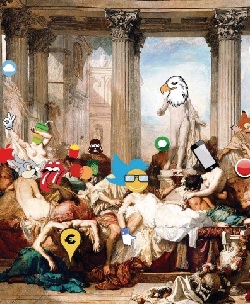
The electoral language makes use of a rhetoric that has outdone the old political distinctions, demonstrating the depriving of meaning of the European civilization, not because of immigrants invasion, but of the planetary americanization that is triggering a not sterile decadence.
Aki Kaurismaki probes Finland’s asylum system
Source: The Economist, 20 February
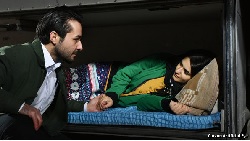
In this second installment of his trilogy about refugees premiered at this year’s Berlinale, Kaurismaki tells two stories of people who have left home to start a new life, juxtaposing the blind unavoidability of the legal mechanisms with the human intelligence of empaty and pity.
Read more:
http://www.economist.com/blogs/prospero/2017/02/other-side-hope
How to have a better death
Source: The Economist, 29 April
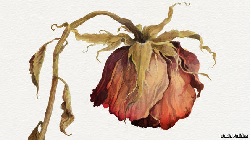
A medical-assisted dying means a better care of life for some patients, but it’s as much needed a change in the way health-care systems deal with seriously ill patients, and communicate with them, ensuring the access to palliative medicine and the social support.
Read more:
http://www.economist.com/news/leaders/21721371-death-inevitable-bad-death-not-how-have-better-death
Info
- Pubblicato il : 19/12/2017 Modificato il : 04/04/2019

